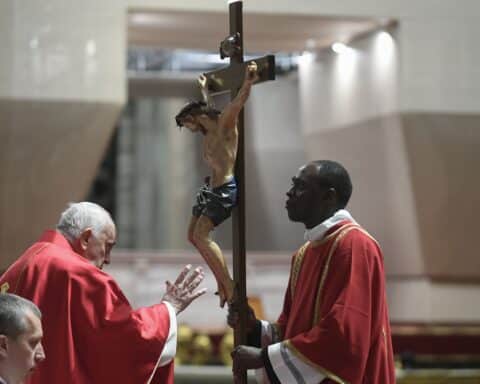God didn’t have to reveal any name to Moses.
In fact, one can interpret Moses’ request that God reveal his name as an exercise of mastery, a desire to control the living God.
Moses approaches the burning bush with wonder. The bush burns without being consumed, an almost unimaginable marvel. He removes his sandals from his feet and listens to the very voice of God.
God reveals his identity to Moses. He is the God of Abraham, of Isaac and of Jacob. He is the God who has heard the cry of Israel in Egypt. He is the God who has come to liberate them from the death-dealing slavery of the Egyptians. He is the God who will give Israel gift beyond gift, a land of milk and honey.
He is the one glorious God, who has chosen this people above all others. He is the God of mercy.
| Third Sunday of Lent: March 24, 2019 |
|---|
|
EX 3:1-8A, 13-15
PS 103:1-2, 3-4, 6-7, 8, 11 1 COR 10:1-6, 10-12 LK 13:1-9to |
But that’s not enough for Moses. He wants to know the name of this God, saying, “if I go to the Israelites and say to them, ‘The God of your ancestors has sent me to you,’ and they ask me, ‘What is his name?’ what do I tell them?” (Ex 3:13).
Moses wants a bit of control, to dictate the terms of the relationship. It is not enough that this God has entered into history. Moses wants power over this God.
The God of Abraham, of Isaac and of Jacob gives Moses a transcendent mercy. He doesn’t kowtow to Moses’ demand for a name. Instead, he gives the strangest of names, the name that is not a name at all. God says something like, “I am who I am. I am the one who has entered into history. I am the creator of the cosmos, the one who has ordered all things. I alone am. There is no other god because I alone am God.”
This sacred name, this name that cannot even be uttered, continues God’s divine pedagogy of bending down in love to Israel. God is willing to be called by name, to hear the cries of his people. God is merciful.
In Jesus, the anointed one of God, we don’t simply learn God’s name. We encounter the God who has assumed flesh. The transcendent mercy of God has become a person and taken a name.
Mercy, in our time, often is set up as against justice. Mercy becomes a stand-in for benign tolerance, the God who doesn’t care enough to act.
This is not Jesus. He preaches that repentance is required here and now. Death may overtake us. The time is now, for God’s judgment is at hand.
At the same time, Jesus describes the tender mercy of a God who holds out hope for just a little longer that we may repent. This God holds out hope not because of a character flaw. Instead, this is the God of transcendent mercy, who should judge the world. But instead he has chosen to love us. To become one of us. To redeem us.
The season of Lent is a time to respond to the transcendent and tender mercy of God. It’s time to repent of our sins. To give up the desire for mastery and control, of seizing power at all costs.
God has given us this acceptable time to return. Lent is the time of mercy, the opportunity to reform ourselves that we might better reflect our identity as a person created in the image and likeness of God.
We don’t need to be perfect to practice mercy this Lent. All we need to do is give God the smallest of spaces, the tiniest crack, to heal our wounds.
Jesus Christ, son of the living God, have mercy on me, a sinner who knows your transcendent mercy.





